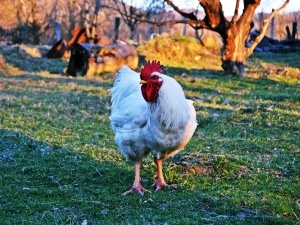
If you pay close attention you’ll realize that chickens can be quite odd on occasion. These birds will do unexpected things like gulp.
This article looks into why your chicken may be gulping.
Table of Contents
Why is my chicken gulping?
Gulping, or swallowing, is normal and natural for humans, it’s how we get food down from our mouths into our throats.
But chickens don’t swallow the same way that humans do, so why would they gulp?
Here is why your chicken may be gulping:
Adjusting the crop:
Your chicken’s body has a few body parts that you don’t have, like a crop.
This organ is found at the base of the bird’s throat and its use is to hold food for a while before the food moves into the bird’s stomach
The bird’s body usually allows food to flow easily from the crop to the stomach but sometimes issues develop.
If the bird’s crop gets too full then this can be very uncomfortable for the bird and the bird will have to adjust its crop.
This will look like the bird stretching its neck out, opening its mouth wide, and gulping.
This isn’t gulping the same way that humans gulp, it is simply the bird adjusting its crop.
What to do:
This isn’t something to worry about, as long as the bird only does this on occasion, and as long as the bird doesn’t start to show signs of illness then the bird will be fine.
If your bird starts to show signs of illness, like self-isolation, fluffed-up feathers, a decrease in appetite, lethargy, coughing, and sneezing then the bird may be sick.
Illness:
If your bird is not adjusting its crop then the bird may actually be ill.
Your gulping chicken may have an advanced respiratory infection or a parasitic infection like gapeworm.
Gapeworm can cause a blockage in the bird’s airway
This sick bird will gulp in an effort to straighten its airway or move blockages in the airway.
Other signs of a respiratory infection in your bird include coughing, sneezing, shaking of the head, lethargy, watery eyes, a decreased appetite, labored breathing, and panting or open-mouth breathing
Other signs of gapeworm include runny eyes and nose, gurgling sounds from the bird’s chest when the bird breathes, wheezing or hissing, gasping for breath, and open mouth breathing.
What to do:
Gapeworm can be treated at home but a bird with a respiratory infection may need to be treated at the vet.
You can look into the bird’s mouth, down the bird’s throat, in search of the worms.
You can alternatively swipe the bird’s throat using a Q-tip to see if the bird has worms.
If the bird has gapeworm then you can give the bird aviverm or flubendazole to treat the infection.
Give your chicken two treatments, 7-14 days apart, or as recommended on the package.
It is also recommended that you treat the rest of the flock for this condition.
If you suspect that your chicken has a respiratory infection then it is recommended that you take the bird to the vet for an examination, diagnosis, and treatment.
If you enjoyed this article then you may also be interested in other bird related articles. Here are some articles that you may be interested in: Why Is My Budgie Always Tired?, My Budgie Just Sits There, Chicken Throwing Up Green Liquid, Cockatiel Not Eating And Sleeping, Baby Cockatiel Not Eating Formula, How To Know If Your Baby Cockatiel Is Hungry, Can You Overfeed A Baby Cockatiel?

